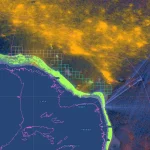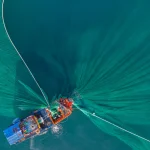Why Knowing Who Owns What Matters: OECD’s New IUU Fishing Recommendation
- By Claudia Deeg
- Published
Illegal, unreported and unregulated (IUU) fishing is among the biggest threats to sustainable ocean governance. It undermines enforcement systems, distorts markets and impacts the livelihoods of coastal communities worldwide. At the heart of the problem lies a key question: Who ultimately profits from these illegal activities? Bringing the true beneficiaries of illegal fishing to light is essential to dismantling the networks that enable and profit from IUU activities.
Earlier this year, the Organization for Economic Cooperation and Development (OECD) took an important step in addressing this issue. During its 2025 council meeting at ministerial level (MCM) the OECD formally adopted the recommendation on eliminating government support to illegal, unreported and unregulated fishing. The recommendation urges countries to implement strong policies ensuring public funding does not unintentionally support vessels involved in IUU fishing activities.
Importantly, the OECD recognizes the role of ultimate beneficial ownership (UBO) transparency in achieving this objective. The OECD Fisheries Committee suggests that countries should, where practicable, provide support only to vessels for which information on beneficial owners is available. It also encourages the sharing of UBO information in the context of IUU fishing determinations, including through international organizations such as Regional Fisheries Management Organizations or Arrangements (RFMO/As).
UBO transparency seeks to identify the individuals profiting from a vessel’s activities, who may attempt to hide their identities behind layers of companies and legal obscurity. By promoting the collection and exchange of UBO data, the OECD acknowledges that uncovering who truly controls and benefits from fishing operations — beyond registered owners or operators — is vital to improving accountability in global fisheries. This approach ensures that individuals responsible for illegal behavior can be identified and that their connections to other fishing ventures are tracked and closely monitored.
Why UBO transparency matters in the fight against IUU fishing
Strengthening UBO transparency is more than just good governance. It directly helps governments and regulators:
- Identify the true beneficiaries of public support: Making UBO information accessible helps governments ensure that subsidies, preferential access arrangements and other forms of support are not granted to entities involved in IUU fishing or connected to past violations.
- Reinforce due diligence mechanisms: Regulatory bodies and subsidy administrators can better assess risks and apply precautionary measures when they know the actual persons behind a company or vessel.
- Enable targeted enforcement: Authorities can dismantle complex ownership structures used to obscure responsibility and evade sanctions or legal consequences.
Global action for accountability
To put the OECD recommendation into action, Global Fishing Watch encourages countries to:
- Collect and publish — where practicable — data on ultimate beneficial owners of fishing vessels and licenses in national registries, particularly of distant water vessels. This could involve publishing the information in existing authorized vessel registries and/or in central UBO registers, where such systems already collect data from other sectors like finance and extractive industries.
- Support the inclusion of UBO data fields on the authorized vessel lists and/or IUU vessel lists of the RFMO/As to which the country is a member, if not already present;
- Regularly upload beneficial ownership data to the Food and Agriculture Organization (FAO) Global Record of Fishing Vessels, Refrigerated Transport Vessels and Supply Vessels, the Global Information Exchange System of the Port State Measures Agreement (PSMA) and the vessel lists of applicable RFMO/As.
Using technology to support UBO transparency
Global Fishing Watch actively supports countries advancing UBO transparency in fisheries through its Vessel Viewer platform and analytical tools. These make ownership data more accessible, actionable and aligned with global standards.
Vessel Viewer also allows users to track the operating and ownership history of individual vessels over time, bringing visibility to the companies and individuals associated with fishing activities. By cross-referencing information from multiple sources including national registries and public databases, the platform can flag identity changes, data inconsistencies, missing records and undisclosed beneficial owners. These insights are crucial for identifying operation behaviors, including hidden beneficial owner and ownership structures, strengthening enforcement and subsidy decisions. They also support risk-based decision-making, enforcement planning and the prevention of public support going to vessels linked to IUU fishing — directly aligning with the OECD recommendation.
Global efforts to combat IUU fishing — through the OECD, FAO, RFMO/As and more — rely heavily on transparency as a foundation. UBO transparency is becoming a cornerstone of responsible fisheries governance and is emerging as a priority area for future OECD initiatives, with the potential development of voluntary best practice guidelines under consideration. More than a policy imperative, UBO transparency is a critical tool for protecting ocean resources and ensuring a fair, legal and sustainable fishing industry worldwide.
Related Expert

Director of International Policy, Global Programs



